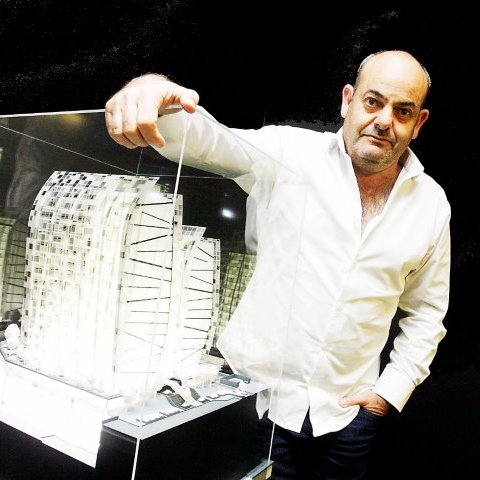
News

Designing the Johannesburg skyline
GILLIAN KLAWANSKY
Orelowitz and Paragon took home four out of seven awards at the South African Property Owners’ Association (SAPOA) Awards of Excellence in Innovative Property Development, last month.
The Paragon Group is not at the cutting edge of architectural development in South Africa, they are the cutting edge.
And for Orelowitz, co-founder and owner of the group, a childhood passion for construction laid the foundation for building this legacy.
A breathtaking addition to the increasingly impressive Sandton skyline, the Sasol Corporate Campus on Katherine Street, designed in the shape of an “S”, is a shining example of the architectural excellence for which the Paragon Group is known.
The building ensured that the group won three of their four SAPOA awards, including one for Best Overall Winner.
They also won Best Innovation Project for the General Electric (GE) Innovation Centre in Glenhove Road, Houghton. They are also known for the striking Norton Rose Fulbright offices on Alice Lane.
Paragon is an internationally active African design company, which started operations in 1997 with just founding directors Orelowitz and his business partner Henning Rasmuss. Today they oversee a staff of 110.
For Orelowitz, the business was the realisation of a long-held dream he once feared would never be realised.
A King David alumnus, Orelowitz had early architectural ambitions. “My earliest memories, even in nursery school, are of building things,” he says. “My parents built a house when I was about seven and I found the process fascinating.
“The architect, Mike Challis, was very inclusive and largely due to him I decided that I wanted to be an architect.” Going on to do art and then sculpture at the Bill Ainslie Art Foundation as a teenager, Orelowitz expanded his knowledge base.
He also loved entrepreneurship. “A King David education teaches you how to be entrepreneurial; it drives the idea of being master of your own destiny. I never thought of anything but going into my own practice and I think that comes from this culture they fostered.”
Yet, in his final year of architecture at Wits, Orelowitz began losing his eyesight, casting his future plans into doubt. The doctors weren’t sure of the cause and of whether the vision loss would be degenerative, so they needed to monitor it over five years.
“After I finished my year apprenticeship, I got my MBA,” he says. “I then worked in Standard Bank in property finance for three years, until they were certain that my eyes were stable. Combining the MBA with architecture was such a gift. My work in property finance also steered me to commercial practice.
The experience around my eyes focused me, providing the understanding that time is precious and you need to make the most of it.”
While the initial growth of Paragon was slow, expansion over the last five years has been rapid, with their staff complement almost doubling. Sustaining the company culture and maintaining quality control have therefore been challenges the company has had to tackle.
“You never stop learning. I thought I’d learned everything by the time I reached 35 and at 52 I’m discovering that the journey of growth and learning is just an ongoing process.”
With every project, client needs are central. “Aside from practical considerations like the way the building faces and what materials are used, the drivers of the design of our buildings are less about form and more about the quality of the user experience – enhancing people’s lives when they occupy these buildings, bringing in light and fresh air, providing a sense of volume and creating an evocative space that makes you want to go to work,” says Orelowitz.
“The building represents the people who occupy it. Our buildings are superefficient in their relationship to the environment and in terms of how people occupy them – they should enhance quality of life.”
In staying ahead of design trends, Paragon looks at global best practice and innovates against that, trying to make each of its buildings better than the last. “We continuously re-evaluate and reinvent both in our designs and as a business. Paragon is driven by its people; it’s not about an individual, but a collective of talent.”
For the last 10 years Orelowitz has also run property development business, Alchemy with CEO Greg Sacks and co-directors David Frankel and Steffen Schneier. “Architecture is a part of my life and property development with Alchemy is another. It’s been a great journey.”
Orelowitz is married to fellow King David alumnus, clinical psychologist Zahava Aarons. They have two sons of 12 and 16.
Maintaining a balance between work and family has been hard, he says, especially in an intense industry that often demands long hours. While it’s got easier as the practice has grown, there are still sometimes all-nighters.
“You can only do that with the support of your family,” he says. “It’s been a collective effort, with my wife supporting my commitment to the practice.”
He has no plans to slow down. “It’s a passion, it’s not a job. I’m lucky, I wake up every morning and do what I love.”





Carol hernstad
July 8, 2017 at 9:30 pm
‘awesome article cousin Anthony. You make our family proud .. !’